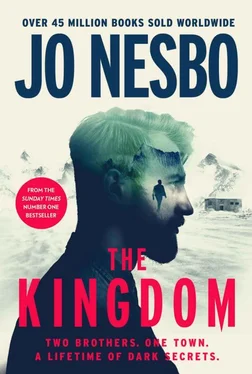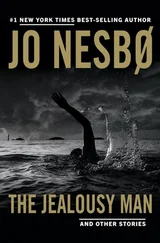‘Course the guy was a pervert, he dressed up like a woman,’ said Simon, already slightly drunk and aggressive.
‘If by pervert you mean homosexual, well, you also get heterosexual men who’d rather look like women,’ said Stanley.
‘Fucking sick if you ask me,’ said Simon, looking at the new chairman. ‘It’s not natural.’
‘Not necessarily,’ said Stanley. ‘Animals cross-dress too. You, Roy, with your interest in birds, you probably know that in certain species of bird the male imitates the female. They camouflage themselves as females by using the same feathering.’
The others looked at me and I felt myself turning red.
‘And not just on special occasions,’ Stanley continued. ‘They carry this female phenotype throughout their lives, don’t they?’
‘Not any of the mountain birds I’m familiar with,’ I said.
‘See?’ said Simon, and Stanley gave me a quick look as much as to say I’d let him down. ‘Nature’s practical, so what the hell would be the point of dressing up like a woman?’
‘It’s quite simple,’ said Shannon. ‘The disguised males avoid the attention of the alpha males who want to fight off possible competitors in the sexual market. While the alpha males are fighting it out, the cross-dressers are mating on the quiet, so to speak.’
Chairman Gilbert laughed good-naturedly. ‘Not a bad strategy.’
Stanley laid a hand on Shannon’s arm. ‘Here, at last, we have someone who understands the complexities of the game of love.’
‘Well, it isn’t exactly rocket science,’ said Shannon, smiling. ‘We’re all looking for the most comfortable survival strategy. And if we find ourselves in a situation, personal or social, in which it no longer works, then we try another one that’s necessary, although possibly a little less comfortable.’
‘What do you mean, the most comfortable strategy?’ asked Voss Gilbert.
‘The one that follows the rules of society, so that we don’t risk sanctions. Also known as morality, Mr Chairman. If that doesn’t work, then we break the rules.’
Gilbert raised one of his heavy brows. ‘Many people behave in a moral way even though it isn’t necessarily the most comfortable.’
‘The reason for that is just that for some people the idea of being thought of as immoral is so unpleasant that this becomes an important part of the decision. But if we were invisible and had nothing to lose we wouldn’t care at all. We’re all of us at heart opportunists with survival and the furtherance of our own genetic heritage as the overriding goal in life. That’s why we’re all willing to sell our souls. It’s just that some of us ask a different price from others.’
‘Amen to that,’ said Stanley.
Gilbert chuckled and shook his head. ‘That there is big-city talk. It goes way over our heads. Or am I right, Simon?’
‘Also known as bollocks,’ said Simon, emptying his glass and looking round for a refill.
‘Now now, Simon,’ said the chairman. ‘But you should remember, fru Opgard, that we come from a part of the country in which people sacrificed their lives for the right moral values during the Second World War.’
‘He means the twelve men in that heavy water sabotage action we keep making films about,’ said Stanley. ‘The rest of the population more or less let the Nazis do what they wanted.’
‘You shut your mouth,’ said Simon, his eyelids drooping halfway over his pupils.
‘Those twelve men hardly sacrificed their lives for moral values,’ said Shannon. ‘They did it for their country. Their village. Their families. If Hitler had been born in Norway where the economic and political situation was the same as in Germany, he would have come to power here just the same. And your saboteurs would have been fighting for Hitler instead.’
‘What the fuck!’ Simon snarled, and I took a step forward in case he had to be stopped.
Shannon, however, couldn’t be stopped. ‘Or do you believe that the Germans who lived in the thirties and forties were a generation of out-and-out immoralists, while Norwegians of the time were lucky enough not to be?’
‘Those are pretty strong claims, fru Opgard.’
‘Strong? I can see that they’re provocative and perhaps offensive to Norwegians with a deep emotional attachment to their history. All I’m trying to say is that morality as a motivating force is overrated in us humans. And that our loyalty to our flock is underestimated. We shape morality so that it suits our purposes when we feel our group is under threat. Family vendettas and genocides throughout history are not the work of monsters but of human beings like us who believed they were acting in a way that was morally correct. Our loyalty is primarily to our own and secondarily to the changing morality that at any given time serves the needs of our group. My great-uncle took part in the Cuban revolution, and even today there are still two diametrically opposed but morally equally dogmatic ways of looking at Fidel Castro. And what determines your view of him is not whether you are politically on the right or the left but the degree to which Castro affected the history of your close family, the extent to which they ended up part of the government in Havana or refugees in Miami. Everything else is secondary.’
I felt someone tugging at my jacket sleeve and turned.
It was Grete.
‘Can I have a word with you?’ she whispered.
‘Hi, Grete. We’re just in the middle of a conversation about—’
‘Mating on the quiet,’ said Grete. ‘I heard that.’
Something in the way she said it made me look more closely at her. And those words, they resonated with a hunch I’d had, something I’d already thought.
‘A word then,’ I said, and as we headed towards the bar I could feel both Stanley’s and Shannon’s eyes on my back.
‘There’s something I want you to pass on to Carl’s wife,’ said Grete once we were out of earshot.
‘Why is that?’ I asked ‘why’ instead of ‘what’ because I already knew the ‘what’. Saw it in her murky eyes.
‘Because she’ll believe you.’
‘Why should she believe it if it’s something I’m just passing on?’
‘Because you’ll tell her as though it comes directly from you.’
‘And why should I do that?’
‘Because you want the same thing as me, Roy,’
‘And that is?’
‘For them to split up.’
I wasn’t shocked. Not even surprised. Just fascinated.
‘Come on, Roy, we both know that Carl and that southern girl don’t belong together. We’re only doing what’s best for them. And it’ll save her the slow torment of finding it out herself, poor girl.’
I tried to moisten my throat. Wanted to turn and go but couldn’t. ‘Find out what?’
‘That Carl’s having it away with Mari again.’
I looked at her. The perm stood out around her pale face like a halo. It’s always surprised me that people fall for shampoo adverts that say it revitalises the hair. Hair has never had any life in it that can be re vitalised. Hair’s dead, a cuticle of keratin growing out of a follicle. It’s got as much of life and you in it as the excrement you squeeze out. Hair is history, it’s what you’ve been, eaten and done. And you can’t go back. Grete’s perm was a mummified past, a permafrost, frightening as death itself.
‘They do it at the Aas’s cabin.’
I didn’t answer.
‘I’ve seen it with my own eyes,’ said Grete. ‘They park in the woods so you can’t see the cars from the road and then they meet in the cabin.’
I wanted to ask how much of her time she spent shadowing Carl but didn’t.
‘But it’s no wonder Carl fucks around,’ she said.
She obviously wanted me to ask what she meant by that. But something – the look on her face, the certainty of something, reminded me of when Mum read ‘Little Red Riding Hood’ to us – persuaded me not to. Because as a child I had never understood why Red Riding Hood has to ask the disguised wolf that final question, why it has such big teeth, when she already has a suspicion that it is the wolf. Didn’t she understand that once the wolf realises he’s been unmasked he would grab her and eat her up? What I learned from it was: stop after ‘why do you have such big ears?’ Say you’re going to fetch more wood from the woodshed, and then get the hell out of there. But I just stood there. And like any fucking Little Red Riding Hood I asked: ‘What do you mean by that?’
Читать дальше












